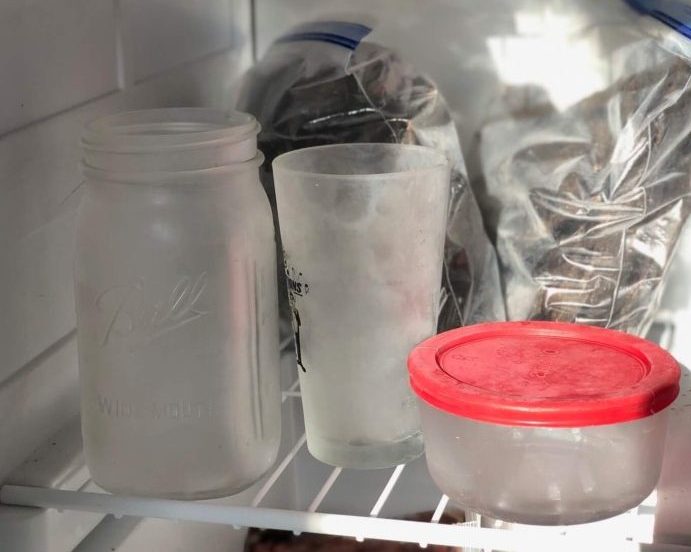
Switching from using plastic containers to storing food with glass is a great way to be more sustainable. Whether you want to know about storing food or you want a chilled glass for a cool beverage, you’re probably wondering if you can put glass in the freezer.
Glass can be put in the freezer as long as you are careful about thermal shock. Don’t heat or cool the glass rapidly. Allow the glass to reach room temperature before placing it in the freezer. However, food stored in glass containers is more likely to get freezer-burned compared to airtight freezer bags.
Below we have some more tips about storing glass in the freezer and how you can avoid thermal shock which can cause glass containers to shatter.
Table of Contents
Can You Put Glass in the Freezer?
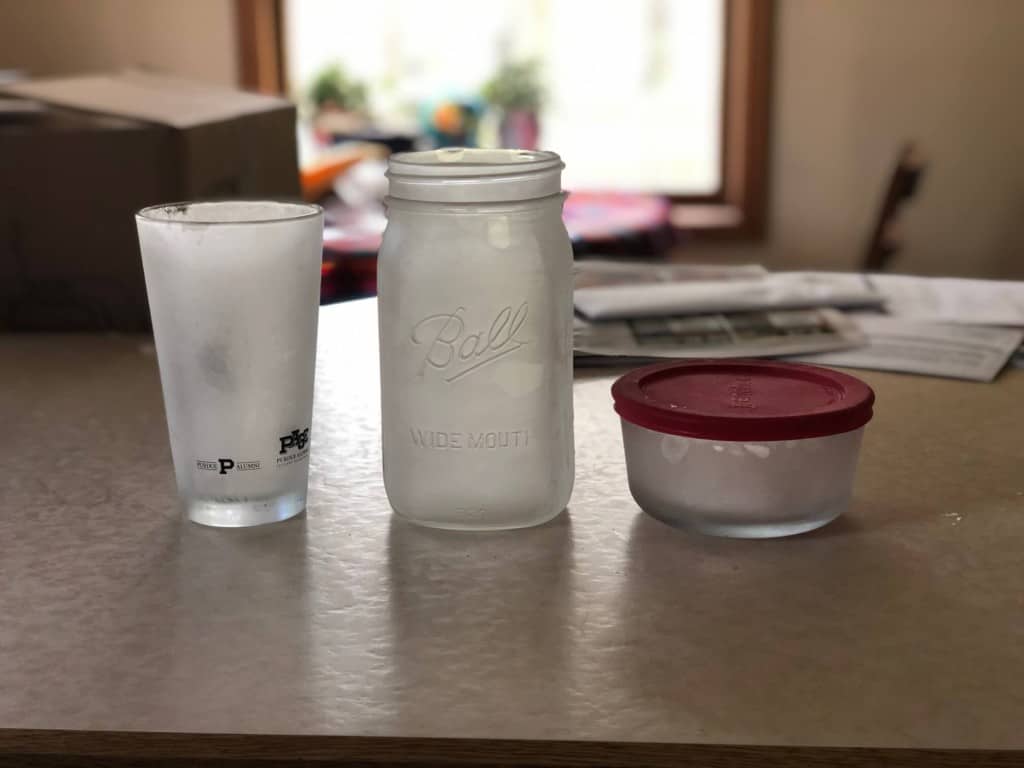
There are a couple of things to keep in mind when putting glass in the freezer. The first is thermal shock and the second is the type of container.
Thermal Shock
First and foremost, you need to be aware of thermal shock. Thermal shock is a rapid and sudden change in temperature that can cause glass to crack or shatter.
The easiest way to prevent thermal shock is to make sure to heat or cool glass slowly. When freezing glass, don’t put it in the freezer if it’s still warm.
Allow the glass to cool to room temperature before putting it in the freezer. And, when taking it out of the freezer, allow the glass to warm slowly.
Also, make sure that you check the glass for cracks or damage to your glass before freezing it. Glass breaks much easier if it has any kind of flaw or damage.
Freezer Safe Glass Containers
Another factor of freezing glass is what type of glass it is. In general, if a glass container is oven-safe, it’s also freezer-safe glass as long as you account for thermal shock.
There are four main types of glass used to make glassware: tempered glass, borosilicate glass, soda-lime silicate glass, and ceramic glass.
Borosilicate glass is one of the most common types of glass found in the kitchen and is used in brands such as Pyrex, it is susceptible to thermal shock.
Soda-lime silicate glass is less susceptible to thermal shock than other types of glass and is used in canning jars which make them a great candidate to be put in the freezer.
If you want to know more about the types of glass used to make kitchenware, we have an in-depth explanation in another article here.
Here are a few examples of glass containers and how they do in the freezer:
1. Mason Jars
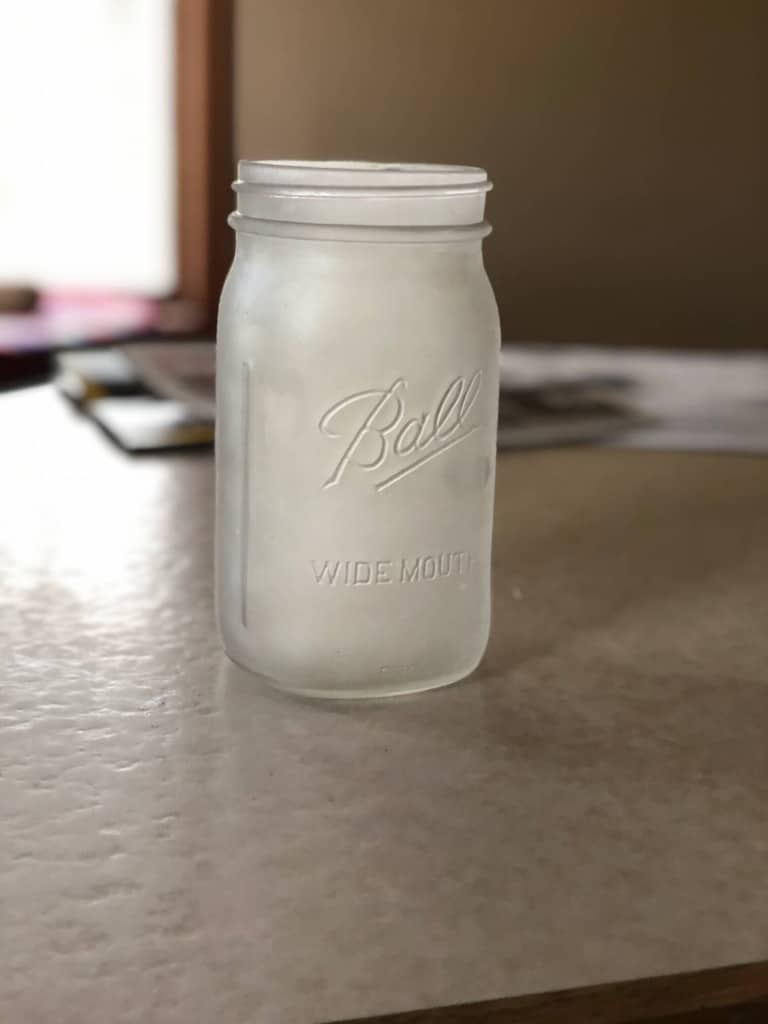
Glass mason jars are freezer-safe as long as you take some precautions. As always, remember thermal shock and act accordingly.
It’s also important to remember that liquid expands during the freezing process. So, if you’re freezing liquid inside a mason jar, make sure you leave plenty of room, at least an inch or two, at the top of the jar to allow the liquid to expand.
On the other hand, you should also keep in mind that if you plan on freezing something for a long period of time, the gap in the jar can give space for freezer burn to form.
Masonjars.com has a great article about freezing mason jars if you want some more information.
But, if you’re not worried about freezer burn, mason jars are a great way to freeze and store food.
2. Pyrex Containers
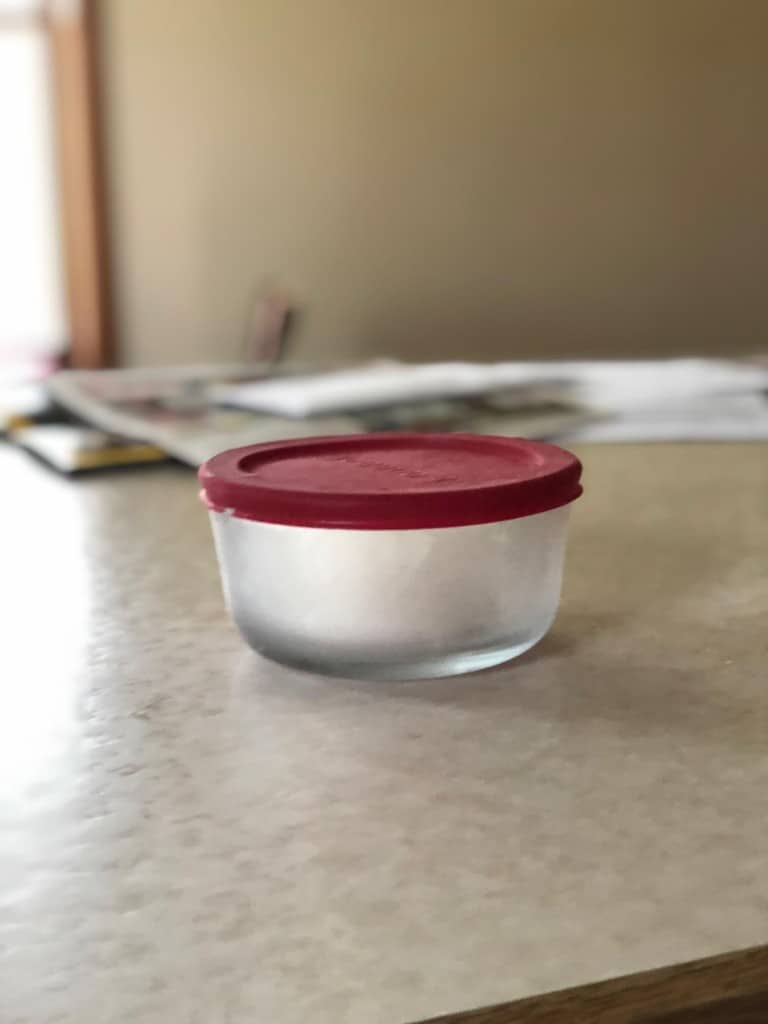
Pyrex containers and other glass storage containers are a great way to store food in your freezer. Once again, make sure you try to prevent thermal shock.
And, just like with mason jars, make sure you leave room at the top for liquid to expand.
But, with Pyrex containers, the lid is rubber and can allow a little expansion for the liquid. So, not leaving a big enough gap isn’t as big of an issue as it is with mason jars.
3. Drinking Glasses
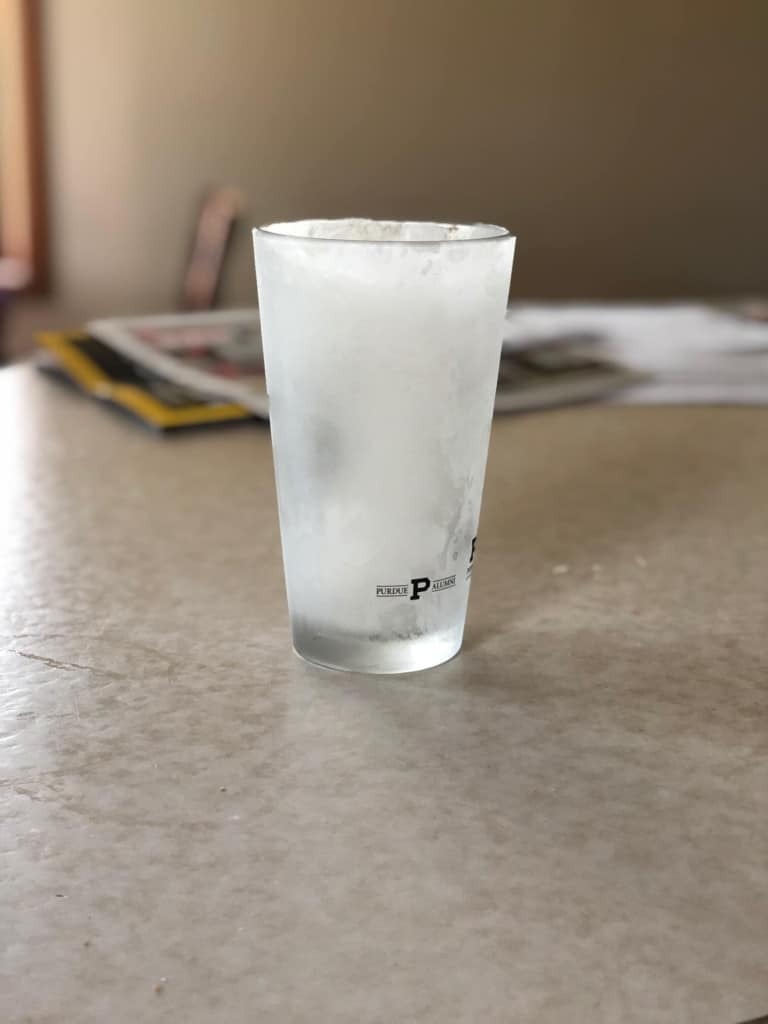
Now, drinking glasses aren’t typically used for storing food but they can be good for storing leftover smoothies or milkshakes.
And, if you want to be really fancy, you can put a glass in the freezer to give yourself a nice chilled drink on a hot summer day.
But, since drinking glasses aren’t made for the freezer, I wouldn’t recommend leaving them in the freezer for long periods of time.
4 Tips for Freezing Glass Containers
Despite your best efforts, glass might break when you put it in the freezer. To try and avoid this, we’ve got a few tips to help prevent glass from breaking when you freeze it.
1. Cool and Warm Slowly
When you’re storing food in glass containers, no matter what kind of container you use, you need to cool and warm it slowly.
This will help prevent thermal shock and decrease the chance of the glass breaking.
You can do this two ways. If you’re storing leftovers, make sure the stuff you plan on storing is cooled before you place it in the container. Or, place it in the container first and then allow it to cool.
When taking a container out of the freezer, allow it to thaw at room temperature before trying to defrost it with any heat.
Doing this will greatly reduce the chance of glass breaking.
2. Avoid Using Shaped Containers
If you’re using mason jars, they are commonly made with ‘shoulders’ meaning they have a curve close to the top of the jar.
These shoulders make a stress point where pressure can build up and break the glass.
Any container that has a shape like this can create stress points. So, when freezing glass containers, it’s better to use wide mouth jars or containers with straight sides. You should avoid a narrow container such as a bottle of beer.
If you do use jars with shoulders, make sure you leave a large gap for the contents to expand. This will help reduce the pressure.
3. Leave Space at the Top
When you freeze food, particularly liquid, it will expand. So, when freezing food, make sure you leave a gap at the top of the container to allow for this expansion.
If you’re using mason jars, leave an inch or two below the lid line. Also, if you use lids, don’t tighten the lids all the way down when you first put it in the freezer or leave the lid off until it’s frozen.
Once it’s frozen, you can tighten the lid or place a lid on the container. This will help prevent pressure from building up in the container.
4. Leave Space Between Containers
Another thing that can cause glass containers to break is if they bump against one another. The clinking of glass can make the frozen containers break much more easily.
To prevent this from happening, keep some space between containers when they freeze. If you’re using Pyrex containers or something similar, the rubber lids create a kind of bumper for your glass.
Keeping space between your glass containers can reduce the chance of your glass breaking.
Benefits of Using Glass Containers
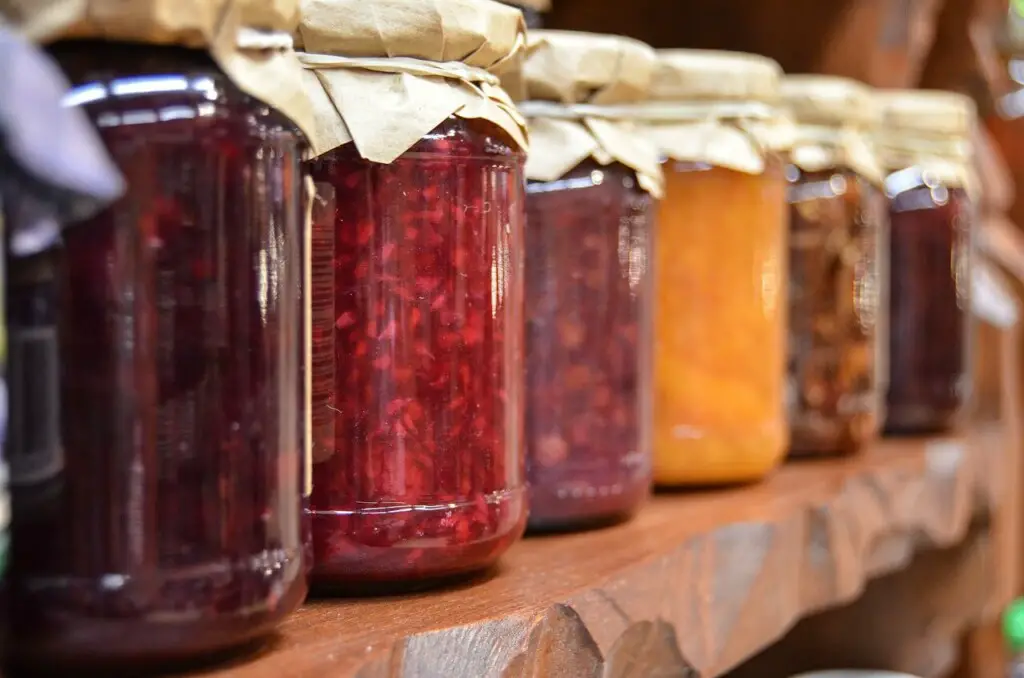
Now that you know how to store things properly in glass containers, let’s talk about why you might want to use glass containers.
1. Reusable
The best reason to use glass containers is they are reusable. Plastic storage containers are reusable to a degree but they wear out much more quickly than glass containers.
Plastic also tends to get brittle if it is frozen and thawed multiple times. Glass, on the other hand, can last for hundreds of freezes as long as you avoid extreme temperature changes and follow safe freezing and thawing practices.
2. Recyclable
Another reason that glass is great is that it is recyclable. Even if your glass container gets a crack or damage to it, it can be recycled.
Glass can be recycled and reformed indefinitely without changing the clarity or durability of the glass. This makes it one of the most sustainable storage materials out there.
If sustainability and being environmentally friendly is a priority for you, then switching from plastic to glass is a great first step.
3. Durable
As we mentioned before, glass is much more durable than some of the other storage container alternatives such as plastic.
As long as you avoid temperature fluctuations and follow proper precautions, then your glass containers could last a lifetime.
4. Doesn’t Trap Odors
Another great benefit of glass containers is they don’t trap in odors and can be stained the color of whatever they contain.
I’ve had this issue before with plastic containers where I used them to store some food in the fridge and then that container smells like that food for the next several wash cycles.
You don’t have this issue with glass containers. If you’ve had this issue frequently and don’t want to deal with it anymore, then it’s time to switch to glass.
5. No Synthetic Materials
Last but not least, glass doesn’t contain any synthetic materials. If your plastic containers are starting to wear out, they could start to leave a plastic-y taste on whatever is being stored in them.
As you can imagine, that’s not something you want to happen.
Luckily though, glass doesn’t have this issue. If your plastic containers are needing replaced or you want to eliminate synthetic materials from your life, then going glass is a great start.
Related Questions
Does Glass Break in the Freezer?
There is always a chance that glass might break in the freezer. But, there are things you can do to prevent it from happening. Warm and cool the glass slowly, avoid shaped containers, leave space at the top for expansion, and leave space between your containers.
Can I Use Glass Jars to Freeze Food?
You can use glass jars to freeze food, but you should take a few steps to prevent the glass from breaking or cracking. Specifically, you should try to avoid jars with shoulders and leave space at the top to allow for expansion. You should also leave space between jars to prevent them from clinking together.
Can You Freeze Drinks in Glass Bottles?
Drinks in glass bottles have no room to expand so placing drink bottles in the freezer, such as soda or beer, could cause the bottle to shatter. A better way to get your drink nice and chilled is to chill a drinking glass and then pour the bottled drink into the glass. If that’s not an option, you can put a bottled drink in the freezer if you only put it in the freezer for less than fifteen minutes. Watch it closely!
